- Home
- V. E. Schwab
A Gathering of Shadows Page 5
A Gathering of Shadows Read online
Page 5
And when they did, she would show him what she could do.
I
RED LONDON
Kell knelt in the center of the Basin.
The large circular room was hollowed out of one of the bridge pillars that held up the palace. Set beneath the Isle’s current, the faintest red glow from the river permeated the glassy stone walls with eerie light. A concentration circle had been etched into the stone floor, its pattern designed to channel power, and the whole space, wall and air alike, hummed with energy, a deep resonant sound like the inside of a bell.
Kell felt the power welling in him, wanting out—felt all the energy and the tension and the anger and the fear clawing for escape—but he forced himself to focus on his breathing, to find his center, to make a conscious act of the process that had become so natural. He wound back the mental clock until he was ten again, sitting on the floor of the monastic cell in the London Sanctuary, Master Tieren’s steady voice in his head.
Magic is tangled, so you must be smooth.
Magic is wild, so you must be tame.
Magic is chaos, so you must be calm.
Are you calm, Kell?
Kell rose slowly to his feet, and raised his head. Beyond the concentration circle, the darkness twisted and the shadows loomed. In the flickering torchlight, sparring forms seemed to take the faces of enemies.
Tieren’s soothing voice faded from his head, and Holland’s cold tone took its place.
Do you know what makes you weak?
The Antari’s voice echoed in his head.
Kell stared into the shadows beyond the circle, imagining a flutter of cloak, a glint of steel.
You’ve never had to be strong.
The torchlight wavered, and Kell inhaled, exhaled, and struck.
He slammed into the first form, toppling it. By the time the shadow fell, Kell was already turning on the second one at his back.
You’ve never had to try.
Kell threw out his hand; water leaped to circle it and then, in one motion, sailed toward the figure, turning to ice the instant before it crashed into the form’s head.
You’ve never had to fight.
Kell spun and found himself face to face with a shadow that took the shape of Holland.
And you’ve certainly never had to fight for your life.
Once he would have hesitated—once he had hesitated—but not this time. With a flick of his hand, metal spikes slid from the sheath at his wrist and into his palm. They rose into the air and shot forward, burying themselves in the specter’s throat, his heart, his head.
But there were still more shadows. Always more.
Kell pressed himself against the Basin’s curved wall and raised his hands. A small triangle of sharpened metal glinted on the back of his wrist; when he flexed his hand down it became a point, and Kell sliced his palm across with it, drawing blood. He pressed his hands together, then pulled them apart.
“As Osoro,” he told the blood.
Darken.
The command rang out, echoing through the chamber, and between his palms the air began to thicken and swirl into shadows as thick as smoke. It billowed forth, and in moments the room was engulfed in darkness.
Kell sagged back into the cold stone wall of the room, breathless and dizzy from the force of so much magic. Sweat trickled into his eyes—one blue, the other solid black—as he let the silence of the space settle over him.
“Did you kill them all?”
The voice came from somewhere behind him, not a phantom but flesh and blood, and threaded with amusement.
“I’m not sure,” said Kell. He collapsed the space between his palms, and the veil of darkness dissolved instantly, revealing the room for what it was: an empty stone cylinder clearly designed for meditation, not combat. The sparring forms were scattered, one burning merrily, another shot full of metal lances. The others—bashed, battered, broken—could hardly be called training dummies anymore. He closed his hand into a fist, and the fire on the burning dummy went out.
“Show-off,” muttered Rhy. The prince was leaning in the arched entryway, his amber eyes caught like a cat’s by the torchlight. Kell ran a bloody hand through his copper hair as his brother stepped forward, his boots echoing on the stone floor of the Basin.
Rhy and Kell were not actually brothers, not by blood. One year Rhy’s senior, Kell had been brought to the Arnesian royal family when he was five, with no family and no memory. Indeed, with nothing but a dagger and an all-black eye: the mark of an Antari magician. But Rhy was the closest thing to a brother Kell had ever known. He would give his life for the prince. And—very recently—he had.
Rhy raised a brow at the remains of Kell’s training. “I always thought being an Antari meant you didn’t need to practice, that it all came”—he gestured absently—“naturally.”
“The ability comes naturally,” replied Kell. “The proficiency takes work. Just as I explained during every one of your lessons.”
The prince shrugged. “Who needs magic when you look this good?”
Kell rolled his eyes. A table stood at the mouth of the alcove, littered with containers—some held earth, others sand and oil—and a large bowl of water; he plunged his hands into the latter and splashed his face before his blood could stain the water red.
Rhy passed him a cloth. “Better?”
“Better.”
Neither was referring to the refreshing properties of the water. The truth was, Kell’s blood pulsed with a restless beat, while the thing that coursed within it longed for activity. Something had been roused in him, and it didn’t seem intent on going back to sleep. They both knew Kell’s visits down to the Basin were increasing, both in frequency and length. The practice soothed his nerves and calmed the energy in his blood, but only for a little while. It was like a fever that broke, only to build again.
Rhy was fidgeting now, shifting his weight from foot to foot, and when Kell gave him a once-over, he noticed that the prince had traded his usual red and gold for emerald and grey, fine silk for wool and worn cotton, his gold-buckled boots replaced by a pair of black leather.
“What are you supposed to be?” he asked.
There was a glint of mischief in Rhy’s eyes as he bowed with a flourish. “A commoner, of course.”
Kell shook his head. It was a superficial ruse. Despite the clothing, Rhy’s black hair was glossy and combed, his fingers dotted with rings, his emerald coat clasped with pearlescent buttons. Everything about him registered as royal. “You still look like a prince.”
“Well, obviously,” replied Rhy. “Just because I’m in disguise, doesn’t mean I don’t want to be recognized.”
Kell sighed. “Actually,” he said. “That’s exactly what it means. Or would mean, to anyone but you.” Rhy only smiled, as if it were a compliment. “Do I want to know why you are dressed like that?”
“Ah,” said the prince. “Because we’re going out.”
Kell shook his head. “I’ll pass.” All he wanted was a bath and a drink, both of which were available in the peace of his own chambers.
“Fine,” said Rhy. “I’m going out. And when I’m robbed and left in an alley, you can tell our parents what happened. Don’t forget to include the part where you stayed home instead of ensuring my safety.”
Kell groaned. “Rhy, the last time—”
But the prince waved off the last time as if it hadn’t involved a broken nose, several bribes, and a thousand lin in damages.
“This will be different,” he insisted. “No mischief. No mayhem. Just a drink at a place befitting our station. Come on, Kell, for me? I can’t spend another minute cooped up planning tournaments while Mother second guesses my every choice, and Father worries about Faro and Vesk.”
Kell didn’t trust his brother to stay out of trouble, but he could see in the set of Rhy’s jaw and the glint in his eyes, he was going out. Which meant they were going out. Kell sighed and nodded at the stairs. “Can I at least stop by my rooms and change?”
“No need,” said Rhy cheerfully. “I’ve brought you a fresh tunic.” He produced a soft shirt the color of wheat. Clearly he meant to usher Kell out of the palace before he could change his mind.
“How thoughtful,” muttered Kell, shrugging out of his shirt. He saw the prince’s gaze settle on the scar scrawled across his chest. The mirror image of the one over Rhy’s own heart. A piece of forbidden, irreversible magic.
My life is his life. His life is mine. Bring him back.
Kell swallowed. He still wasn’t used to the design—once black, now silver—that tethered them together. Their pain. Their pleasure. Their lives.
He pulled on the fresh tunic, exhaling as the mark disappeared beneath the cotton. He slicked his hair back out of his face and turned to Rhy. “Happy?”
The prince started to nod, then stopped. “Almost forgot,” he said, pulling something from his pocket. “I brought hats.” He placed a pale grey cap gingerly on his black curls, taking care to set it at a slight angle so the scattering of green gems shone across the brim.
“Wonderful,” grumbled Kell as the prince reached out and deposited a charcoal-colored cap over Kell’s reddish hair. His coat hung from a hook in the alcove, and he fetched it down and shrugged it on.
Rhy tutted. “You’ll never blend in looking like that,” he said, and Kell resisted the urge to point out that with his fair skin, red hair, and black eye—not to mention the word Antari following him wherever he went, half prayer and half curse—he would never blend in anywhere.
Instead he said, “Neither will you. I thought that was the point.”
“I mean the coat,” pressed Rhy. “Black isn’t the fashion this winter. Haven’t you got something indigo or cerulean hidden away in there?”
How many coats do you suppose there are inside that one?
The memory caught him like a blow. Lila.
“I prefer this one,” he said, pushing the memory of her away, a pickpocket’s hand swatted from the folds of a coat.
“Fine, fine.” Rhy shifted his weight again. The prince had never been skilled at standing still, but Kell thought he’d gotten worse. There was a new restlessness to his motions, a taut energy that mirrored Kell’s. And yet, Rhy’s was different. Manic. Dangerous. His moods were darker and their turn sharper, cutting the span of a second. It was all Kell could do to keep up. “Are we ready, then?”
Kell glanced up the stairs. “What about the guards?”
“Yours or mine?” asked the prince. “Yours are standing by the upper doors. Helps that they don’t know there’s another way out of this place. As for my own men, they’re probably still outside my room. My stealth really is in fine form today. Shall we?”
The Basin had its own route out of the palace, a narrow staircase that curled up one of the structure’s supports and onto the bank; the two made their way up, lit only by the reddish dark and the pale lanterns that hung sparsely, burning with eternal flames.
“This is a bad idea,” said Kell, not because he expected to change Rhy’s mind, but simply because it was his job to say it, so that later he could tell the king and queen he’d tried.
“The best kind,” said Rhy, looping his arm around Kell’s shoulders.
And with that the two stepped out of the palace, and into the night.
II
Other cities slept away the winter months, but Red London showed no signs of retreat. As the two brothers walked the streets, elemental fires burned in every hearth, steam drifting from the chimneys, and through his clouded breath, Kell saw the haloed lights of the Night Market lining the bank, the scent of mulled wine and stew drifting on the steam, and the streets bustling with scarf-wrapped figures in jewel-toned cloaks.
Rhy was right: Kell was the only one dressed in black. He pulled the cap down over his brow, to shield him less from the cold than the inevitable looks.
A pair of young women strolled past, arm in arm, and when one cut a favoring glance at Rhy, nearly tripping over her skirts, he caught her elbow.
“An, solase, res naster,” she apologized.
“Mas marist,” replied Rhy in his effortless Arnesian.
The girl didn’t seem to notice Kell, who still hung a step back, half in the bank’s shadow. But her friend did. He could feel her eyes hanging on him, and when he finally met her gaze, he felt a grim satisfaction at her indrawn breath.
“Avan,” said Kell, his voice little more than fog.
“Avan,” she said, stiffly, bowing her head.
Rhy pressed his lips to the other girl’s gloved fingers, but Kell didn’t take his eyes off the one watching him. There had been a time when Arnesians worshipped him as blessed, fell over themselves trying to bow low enough; while he never relished that display, this was worse. There was a measure of reverence in her eyes, but also fear and, worse, distrust. She looked at him as if he were a dangerous animal. As if any sudden movement might cause him to strike. After all, as far as she knew, he was to blame for the Black Night that had swept the city, the magic that made people’s eyes turn as black as his own as it ate them from the inside out. And no matter what statements the king and queen issued, no matter how many rumors Rhy tried to spread to the contrary, everyone believed it was Kell’s doing. His fault.
And in a way, of course, it was.
He felt Rhy’s hand on his shoulder and blinked.
The girls were walking away, arm in arm, whispering furiously.
Kell sighed and looked back at the royal palace arcing over the river. “This was a bad idea,” he said again, but Rhy was already off, heading away from the Night Market and the glow of the Isle.
“Where are we going?” asked Kell, falling into step behind the prince.
“It’s a surprise.”
“Rhy,” warned Kell, who had come to hate surprises.
“Fear not, Brother. I promised you an elegant outing, and I plan to deliver.”
* * *
Kell hated the place the moment he saw it.
It was called Rachenast.
Splendor.
Ruinously loud and riotously colorful, Splendor was a leisure palace where the city’s ostra—their elite—could stave off the coldest months by simply denying their presence. Beyond the silver-plated doors, the winter night evaporated. Inside, it was a summer day, from the fire lanterns burning sun-bright overhead to the artificial arbor, shading everyone beneath a dappled canopy of green.
Stepping from the icy night with its curtain of dark and fog into the expansive, well-lit field, Kell felt suddenly—horribly—exposed. He couldn’t believe it, but he and Rhy were actually underdressed. He wondered if Rhy wanted to cause a scandal or a scene, to have his presence challenged. But the attendants at the doors either recognized the royal prince or Kell himself (and by extension Rhy, since saints knew no one else could drag the Antari to such a fête), because the two were welcomed in.
Kell squinted at the onslaught of activity. Banquet tables were piled with fruit and cheese and pitchers of chilled summer wine, and couples twirled across a blue stone platform made to resemble a pond, while others lounged on pillows beneath the enchanted trees. Wind chimes sang, and people laughed—the high, bright laugh of aristocrats—and toasted their companions with crystal cups, their wealth, like the landscape, on display.
Perhaps the whole charade would have been enchanting if it weren’t so frivolous, so gaudy. Instead, Kell found it insufferable. Red London might have been the jewel of the Arnesian empire, but it still had poor people, and suffering—and yet, here in Splendor, the ostra could play pretend, craft utopias out of money and magic.
On top of it all, Rhy was right: no one else was wearing black, and Kell felt like a stain on a clean tablecloth (he thought of changing his coat, trading out the black for something brighter, but couldn’t bring himself to wear any of the peacock shades so in fashion this winter) as the prince put a hand on his shoulder and ushered him forward. They passed a banquet table, and Rhy took up two flutes of summer wine. K
ell kept his hat on, surveying the room from between the brim of the cap and the rim of the glass Rhy pressed into his hands.
“Do you think they’ve seen through my disguise yet,” mused the prince, keeping his head bowed, “or are they all too busy preening?”
Kell was surprised by the hint of judgment in his brother’s tone. “Give it time,” he said, “we’ve only just arrived.” But he could feel the knowledge moving like a tremor through the room as Rhy led them toward a sofa beneath a tree.
The prince sank into the cushions and cast off his hat. His black curls shone, and even without the usual circlet of gold in his hair, everything about him—his posture, his perfect smile, his self-possession—registered as regal. Kell knew he couldn’t mimic any of those things; he’d tried. Rhy tossed his hat onto the table. Kell hesitated, fingering the brim of his own, but kept it on, his only armor against prying eyes.
He sipped his drink and, having little interest in the rest of Splendor, considered his brother. He still didn’t understand Rhy’s half-hearted disguise. Splendor was a haunt for the elite, and the elite knew the prince’s company better than anyone in the city. They spent months learning the royal tongue just so they could talk their way into his graces (even though Kell knew Rhy found that habit uncomfortable and unnecessary). But the clothes weren’t the only thing that bothered him. Everything about the prince was in its place, and yet …
“Am I really that good-looking?” asked Rhy without meeting his gaze, while glassy laughter chimed through the room.
“You know you are,” answered Kell, dragging his attention to the carpet of grass beneath their feet.
No one approached their couch save for an attendant, a young woman in a white dress, who asked if there was anything she could do to make their evening more enjoyable. Rhy flashed his smile and sent her in search of stronger drink and a flower.
Kell watched as the prince stretched his arms along the back of the sofa, his pale gold eyes glittering as he surveyed the room. This was Rhy at his most understated, and it was still dreadfully conspicuous.

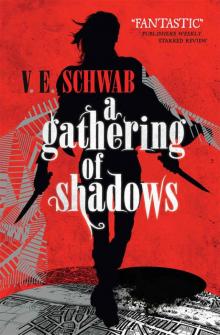 A Gathering of Shadows
A Gathering of Shadows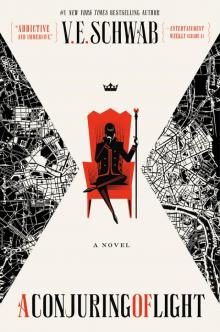 A Conjuring of Light
A Conjuring of Light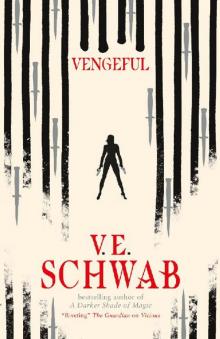 Vengeful
Vengeful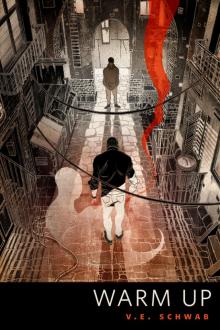 Warm Up
Warm Up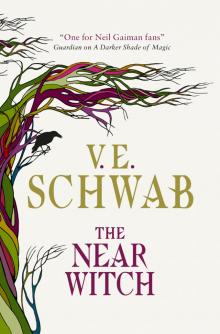 The Near Witch
The Near Witch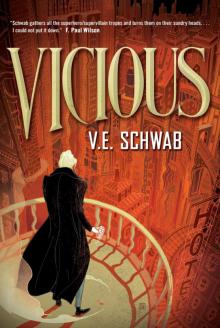 Vicious
Vicious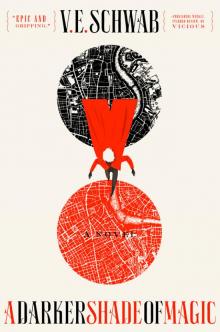 A Darker Shade of Magic
A Darker Shade of Magic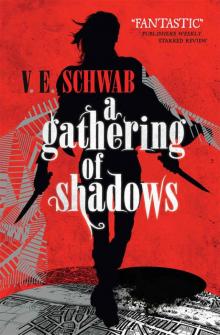 Gathering of Shadows (A Darker Shade of Magic)
Gathering of Shadows (A Darker Shade of Magic)